젖 먹는 아기가 아플 때, When the breastfed infant is sick
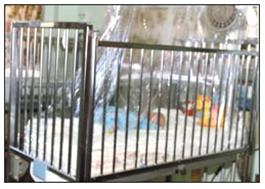
사진 4-150. 젖 먹는 아기가 아파서 치료를 받는 모습
Copyright ⓒ 2011 John Sangwon Lee, MD., FAAP
- 젖 먹는 아기가 감기나 인두염 등 바이러스성 호흡기 감염병을 경미하게 앓으면서도 엄마의 젖을 잘 빨아먹고 대체로 건강하면 모유수유를 계속 해도 된다.
- 그러나 단골 소아청소년과 의사의 지시에 따라 아기의 병을 치료하는 것이 원칙이다.
- 단골 소아청소년과 의사가 동의하면 다음과 같이 치료 하면서 모유수유를 할 수 있다.
- 설사를 조금 하거나 구토를 한두 번 정도 하면서 바이러스성 위장염을 앓을 때도 보통 때와 거의 같게 모유수유를 해도 좋다.
- 그러나 설사 또는 구토를 심하게 하거나 설사, 구토를 동시 하거나 열이 나면서 설사 구토를 하면 즉시 의사에게 문의해야 한다.
- 아기가 젖을 빨아먹을 수 없을 정도로 심하게 앓거나, 엄마의 젖을 먹을 때마다 심한 설사 및, 구토 등의 증상 징후가 있을 때도 즉시, 의사의 지시에 따라 치료 받아야 한다.
- 젖 먹는 아기가 병원에 입원해 있을 때 엄마가 병원에 입원한 아기와 함께 있을 수 없거나, 수유모가 병원에 있는 아기에게 젖을 직접 먹일 수 없을 때는 엄마의 젖을 짜서 젖병에 담아 병원에서 그 젖병 젖을 아기에게 먹일 수 있다.
- 아기가 엄마의 젖을 먹어서는 안 되거나 병으로 인해 젖을 먹을 수 없을 때는 젖을 손으로나 유축기로 짜서 젖병에 담아 냉장고에 보관하거나 버린다.
- 병원에 입원한 아기에게는 인공영양 등 젖 이외 적절한 다른 종류의 보충용 영양분으로 대체해 먹일 수 있다.
- 젖 먹는 아기가 아파서 병원에 입원했을 때 수유모에게 ‘패그스(FAGS) 증후군(병을 앓는 아이들이 육체적 고통 이외 두려움, 분노, 죄의식, 슬픔 등 정신, 정서적 고통을 받는 것)’이 생기는 등 많은 스트레스를 받는다.
- 이 때문에 수유모도 평소처럼 음식물을 충분히 섭취할 수 없고 휴식을 충분히 취할 수 없다. 이렇게 되면 자연스레 모유도 잘 분비되지 않는다.
- 젖 먹는 아기가 경미하게 아플 때 수유모는 가능한 한 평소보다 더 많이 휴식을 취하고 음식물을 보다 더 충분히 섭취해야 한다.
- 특히 수분을 충분히 섭취해야 젖이 더 많이 분비된다. 그렇게 해야 아기가 필요로 하는 영양분, 칼로리와 수분을 충분히 공급할 수 있다. 즉 젖을 충분히 먹여야 아기에게 생길 수 있는 탈수 현상을 예방할 수 있다. 모유만 먹는 아기가 경미한 위장염으로 설사를 조금 할 때 참조. 설사 및, 구토의 일반적 치료 참조, 급성 탈수증 참조
| 모유를 먹는 영아가 경미한 설사를 할 때 어떻게 치료하나 |
Treatment for mild diarrhea of breastfeeding infant
- 젖 먹는 아기가 설사를 경미하게 하지만, 대체적으로 건강한 데다 보채지도 않고 열이 나지 않으면서 젖을 잘 빨아 먹는다면 모유수유를 계속 해도 된다. 그러나 우선 단골 소아청소년과 의사와 전화 상담 치료를 받고 의사의 지시에 따라 치료 한다.
- 수유모도 음식물과 음료수를 보통 때보다 더 많이 섭취하고, 휴식을 더 많이 취해, 모유를 더 많이 분비해야 아기에게 모유를 충분히 먹일 수 있다.
- 젖 먹는 아기가 설사 및, 또는 구토를 하면서 계속 심하게 앓는다면 병원 입원 치료를 받는 것이 더 좋다.
- 설사나 구토를 더 이상 하지 않는 날부터 2~3일까지, 될 수 있으면 모유만 먹이고 우유나 유당이든 인공영양 등 다른 음식물을 아기에게 먹여서는 안 된다.
- 물과 가수분해 단백질 인공영양을 1:1 비율로 섞어 희석한 인공영양, 예를 들면 물로 더 희석한 뉴트라미젠(Nutramigen) 등 비 알레르기성 인공영양(가수분해 단백질로 만든 인공영양)을 의사의 지시에 따라 먹일 수 있다.
- 드물게 모유에 든 음식물의 성분으로 인해 젖 먹는 아기에게 음식물 알레르기가 생겨 아기가 설사를 할 수 있고, 피똥을 눌 수도 있다. 그럴 때는 수유모가 그런 음식물을 섭취하지 말고 치료받아야 한다. 이런 치료도 단골 의사의 지시에 따라한다.
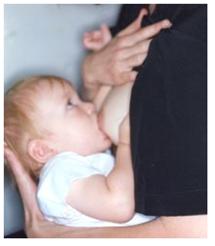
사진 4-151. 모유를 먹는 아기
Copyright ⓒ 2011 John Sangwon Lee, MD., FAAP
| 젖 먹는 아기에게 생긴 설사 및, 또는 구토의 치료 |
Treatments for diarrhea and, or vomiting in the breastfeeding infant
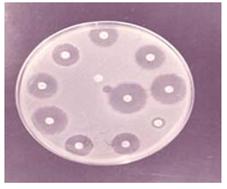
사진 4-152. 설사를 일으킨 원인균을 대변 박테리아 배양검사 등으로 찾아낼 수 있다.
Copyright ⓒ 2011 John Sangwon Lee, MD., FAAP
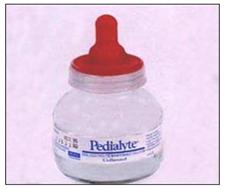
사진 4-153. 의사의 지시에 따라 페디아라이트 등 경구용 포도당 전해질 용액으로 재수화 탈수 치료를 하고, 현상유지 수화 치료도 해서 설사를 치료할 수 있다.
Copyright ⓒ 2011 John Sangwon Lee, MD., FAAP
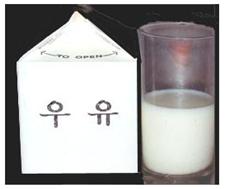
사진 4-154. 바이러스성 위장염이나 박테리아성 위장염 등 감염성 위장염으로 설사를 할 때는 우유나 우유로 만든 음식물을 먹으면 더 심하게 설사를 할 수 있다.
Copyright ⓒ 2011 John Sangwon Lee, MD., FAAP
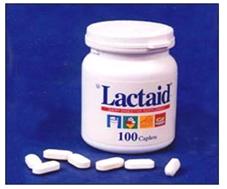
사진 4-155. 유당 불내증이 있을 때 우유나 우유로 만든 음식물을 먹을 때마다 랙테이드를 섭취하면 유당 불내증의 증상 징후가 덜 할 수 있다.
Copyright ⓒ 2011 John Sangwon Lee, MD., FAAP
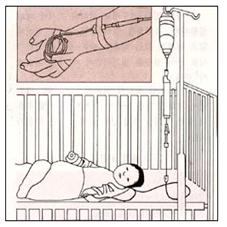
그림 4-32. 포도당 전해질용액 정맥주사로 급성 탈수 재수화 치료를 할 수 있다.
Copyright ⓒ 2011 John Sangwon Lee, MD., FAAP
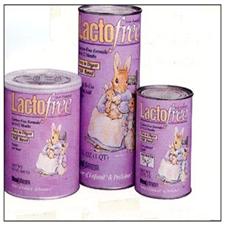
사진 4-156 유당이 들지 않은 영아 포물라(Lactofree infant formula).
유당불내증이 있으면 이런 종류의 인공영양을 먹일 수 있다.
Copyright ⓒ 2011 John Sangwon Lee, MD., FAAP
- 설사나 구토는 어떤 병으로 생기는 증상이다.
- 모유나 인공영양물을 먹는 아기가 구토나 설사를 할 때 효과적으로 치료하려면 구토 및, 또는 설사의 원인, 구토물의 양, 설사 변의 횟수, 설사 변의 양, 설사를 할 때에 구토 하는지, 복통이 있는지, 열이 나는지 등의 설사 및, 또는 구토와 같이 생기는 증상 징후를 알아야 한다.
- 열이 나는지 다른 증상, 징후가 있는지도 알아야 한다.
- 여기에서는 설사의 원인과 관계없이 설사의 일반적 치료에 관해 각 항을 참조하기를 바란다.
When the breastfed infant is sick 젖 먹는 아기가 아플 때

Photo 4-150. A nursing baby being sick and receiving treatment. Copyright ⓒ 2011 John Sangwon Lee, MD., FAAP
If the nursing baby is mildly ill with a viral respiratory infection such as a cold or pharyngitis, but is well sucked on the mother’s milk and is generally healthy, it is okay to continue breastfeeding her.
However, it is a principle to treat the baby’s illness according to the instructions of a regular pediatrician.
If your regular child and the adolescent doctor agree, you can breastfeed while treating as follows. If you have little diarrhea or vomiting once or twice and have viral gastroenteritis, you can breastfeed almost as usual.
However, if you have severe diarrhea or vomiting, or if you have diarrhea or vomiting at the same time, or if you have diarrhea and vomiting with a fever, you should contact your doctor immediately.
When the baby is severely sick enough to be unable to suck on breast milk, or when there are signs of symptoms such as severe diarrhea and vomiting each time the mother’s breast is fed, treatment should be performed immediately and according to the doctor’s instructions.
When a nursing baby is in the hospital, when the mother cannot be with the hospitalized baby, or when the nursing mother cannot directly feed the baby in the hospital, the mother’s milk is milked and placed in a bottle and the bottle is fed to the baby at the hospital.
Can be fed. When the baby is not allowed to feed the mother’s breast milk or is unable to feed due to a bottle, the milk is squeezed by hand or with a breast pump, placed in a bottle and stored in the refrigerator or discarded.
Babies admitted to the hospital can be fed with supplementary nutrients other than milk, such as artificial nutrition.
When a nursing baby is sick and hospitalized, a lot of stress, such as FAGS syndrome (a child suffering from illness suffers mental and emotional pain such as fear, anger, guilt, sadness, etc. other than physical pain). Receive.
Because of this, nursing mothers cannot eat enough food and take enough rest as usual. In this case, breast milk is not secreted naturally.
When a nursing baby is mildly ill, the nursing mother should rest as much as possible and consume more food than usual.
Especially, when you drink enough fluids, more milk is secreted. That way, you’ll be able to provide enough nutrients, calories, and fluids for your baby’s needs. In other words, you can prevent dehydration that may occur in your baby by feeding enough breast milk. Refer to when a baby who is breastfed only has mild gastroenteritis and has a small amount of diarrhea.
See General Treatment of Diarrhea and Vomiting, See Acute Dehydration. How to treat a breastfed infant with mild diarrhea
Treatment for mild diarrhea of breastfeeding infant
Although the breastfeeding baby has mild diarrhea, breastfeeding can continue as long as it is generally healthy, unpleasant, and does not develop a fever and sucks well. However, first of all, you will receive treatment by phone counseling with your regular pediatrician and follow the doctor’s instructions.
Breastfeeding mothers also need to eat more food and drink than usual, take more rest, and secrete more milk to feed the baby enough.
If the nursing baby has diarrhea and/or vomiting and continues to be severely ill, it is better to seek hospital admission.
From the day when diarrhea or vomiting no longer occurs until the 2-3rd day, if possible, only breastfeeding and other foods such as cow milk, lactose or artificial nutrition should not be fed to the baby. Instructed by a doctor for artificial nutrition diluted by mixing water and hydrolyzed protein artificial nutrition in a 1:1 ratio, for example, non-allergic artificial nutrition (artificial nutrition made from hydrolyzed protein) such as Nutramigen further diluted with water.
Can be fed according to.
Rarely, the ingredients in breast milk can cause food allergies to breastfeeding babies, which can lead to diarrhea and blood poop.
In such cases, the nursing mother should be treated instead of eating such food. Such treatment should also be done according to the instructions of a regular doctor.

Photo 4-151. Breastfeeding baby. Copyright ⓒ 2011 John Sangwon Lee, MD., FAAP
Treatment of diarrhea and or vomiting in a nursing baby Treatments for diarrhea and, or vomiting in the breastfeeding infant

Photo 4-152. The causative agent of diarrhea can be identified by stool bacterial culture tests. Copyright ⓒ 2011 John Sangwon Lee, MD., FAAP

Photo 4-153. According to the doctor’s instructions, diarrhea can be treated with rehydration and dehydration treatment with an oral glucose electrolyte solution such as Pedialyte, and the status quo hydration treatment. Copyright ⓒ 2011 John Sangwon Lee, MD., FAAP

Photo 4-154. If you have diarrhea due to infectious gastroenteritis such as viral gastroenteritis or bacterial gastroenteritis, eating cow milk or milk-based foods can cause diarrhea more severely. Copyright ⓒ 2011 John Sangwon Lee, MD., FAAP

Photo 4-155. If you have lactose intolerance, taking lactate each time you eat milk or any food made from milk may reduce the symptoms of lactose intolerance. Copyright ⓒ 2011 John Sangwon Lee, MD., FAAP

Figure 4-32. Acute dehydration and rehydration treatment can be performed by intravenous injection of glucose electrolyte solution. Copyright ⓒ 2011 John Sangwon Lee, MD., FAAP

Picture 4-156 Lactofree infant formula. If you have lactose intolerance, you can feed this kind of artificial nutrition. Copyright ⓒ 2011 John Sangwon Lee, MD., FAAP
Diarrhea or vomiting is a symptom of some disease.
Effective treatment of vomiting or diarrhea when a breastfeeding baby has vomiting and/or diarrhea is the cause of the vomiting and/or diarrhea, the amount of vomiting, the number of diarrhea stools, the number of stools, whether vomiting during diarrhea, abdominal pain, and fever.
Be aware of the signs, symptoms such as diarrhea and vomiting. You should also know if you have a fever or other symptoms or signs.
Please refer to each section here for the general treatment of diarrhea regardless of the cause of the diarrhea.
출처 및 참조 문헌
- NelsonTextbook of Pediatrics 22ND Ed
- The Harriet Lane Handbook 22ND Ed
- Growth and development of the children
- Red Book 32nd Ed 2021-2024
- www.drleepediatrics.com 제1권 소아청소년 응급 의료
- www.drleepediatrics.com 제2권 소아청소년 예방
- www.drleepediatrics.com 제3권 소아청소년 성장 발육 육아
- www.drleepediatrics.com 제4권 모유,모유수유, 이유
- www.drleepediatrics.com 제5권 인공영양, 우유, 이유식, 비타민, 미네랄, 단백질, 탄수화물, 지방
- www.drleepediatrics.com 제6권 신생아 성장 발육 육아 질병
- www.drleepediatrics.com제7권 소아청소년 감염병
- www.drleepediatrics.com제8권 소아청소년 호흡기 질환
- www.drleepediatrics.com제9권 소아청소년 소화기 질환
- www.drleepediatrics.com제10권. 소아청소년 신장 비뇨 생식기 질환
- www.drleepediatrics.com제11권. 소아청소년 심장 혈관계 질환
- www.drleepediatrics.com제12권. 소아청소년 신경 정신 질환, 행동 수면 문제
- www.drleepediatrics.com제13권. 소아청소년 혈액, 림프, 종양 질환
- www.drleepediatrics.com제14권. 소아청소년 내분비, 유전, 염색체, 대사, 희귀병
- www.drleepediatrics.com제15권. 소아청소년 알레르기, 자가 면역질환
- www.drleepediatrics.com제16권. 소아청소년 정형외과 질환
- www.drleepediatrics.com제17권. 소아청소년 피부 질환
- www.drleepediatrics.com제18권. 소아청소년 이비인후(귀 코 인두 후두) 질환
- www.drleepediatrics.com제19권. 소아청소년 안과 (눈)질환
- www.drleepediatrics.com 제20권 소아청소년 이 (치아)질환
- www.drleepediatrics.com 제21권 소아청소년 가정 학교 간호
- www.drleepediatrics.com 제22권 아들 딸 이렇게 사랑해 키우세요
- www.drleepediatrics.com 제23권 사춘기 아이들의 성장 발육 질병
- www.drleepediatrics.com 제24권 소아청소년 성교육
- www.drleepediatrics.com 제25권 임신, 분만, 출산, 신생아 돌보기
- Red book 29th-31st edition 2021
- Nelson Text Book of Pediatrics 19th- 21st Edition
- The Johns Hopkins Hospital, The Harriet Lane Handbook, 22nd edition
- 응급환자관리 정담미디어
-
소아가정간호백과–부모도 반의사가 되어야 한다, 이상원
-
Neonatal Resuscitation American heart Association
-
Neonatology Jeffrey J.Pomerance, C. Joan Richardson
-
Pediatric Resuscitation Pediatric Clinics of North America, Stephen M. Schexnayder, M.D.
-
Pediatric Critical Care, Pediatric Clinics of North America, James P. Orlowski, M.D.
-
Preparation for Birth. Beverly Savage and Dianna Smith
-
Infectious disease of children, Saul Krugman, Samuel L Katz, Ann A. Gershon, Catherine Wilfert
- Pediatric Nutritional Handbook American Academy of Pediatrics
- 소아가정간호백과–부모도 반의사가 되어야 한다, 이상원
- The pregnancy Bible. By Joan stone, MD. Keith Eddleman, MD
- Neonatology Jeffrey J. Pomerance, C. Joan Richardson
- Preparation for Birth. Beverly Savage and Dianna Smith
- 임신에서 신생아 돌보기까지. 이상원
- Breastfeeding by Ruth Lawrence and Robert Lawrence
- Infectious disease of children, Saul Krugman, Samuel L Katz, Ann A. Gershon, Catherine Wilfert
- The Harriet Lane Handbook 19th Edition
- 제4권 모유, 모유수유, 이유 참조문헌 및 출처
- 제5권 인공영양, 우유, 이유, 비타민, 단백질, 지방 탄수 화물 참조문헌 및 출처
- 제6권 신생아 성장발육 양호 질병 참조문헌 및 출처
- 소아과학 대한교과서
- 그 외
|
Copyright ⓒ 2015 John Sangwon Lee, MD, FAAP 미국 소아과 전문의, 한국 소아청소년과 전문의 이상원 저 “부모도 반의사가 되어야 한다”-내용은 여러분들의 의사로부터 얻은 정보와 진료를 대신할 수 없습니다. “The information contained in this publication should not be used as a substitute for the medical care and advice of your doctor. There may be variations in treatment that your doctor may recommend based on individual facts and circumstances. “Parental education is the best medicine.” |